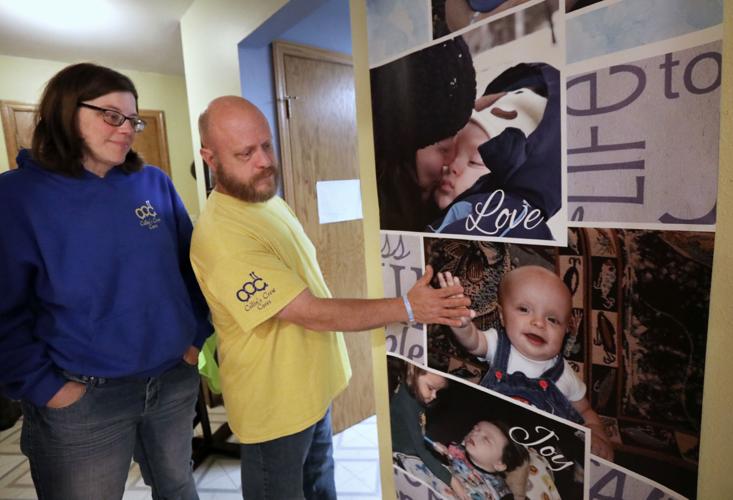Wisconsin could soon decide whether to add a rare, fatal disease to its newborn screening program, a move the state has twice rejected, now that the federal government says states should test for the condition.
State health officials in 2016 and 2021 refused to add Krabbe disease, an inherited brain disorder that typically kills untreated children by age 2, to the 48 conditions for which babies are routinely tested shortly after birth.
The U.S. Department of Health and Human Services on July 1 added infantile Krabbe disease to the Recommended Uniform Screening Panel, or RUSP, a list of rare conditions for which states are urged but not required to screen infants.
People are also reading…
Now, state health officials might reconsider whether to add infantile Krabbe, the most serious form of the disease, found in about 3 per 1 million births. The Wisconsin State Journal examined the debate over screening for the disease and other conditions in a 2021 series.

Judy and Kevin Cushman, in a 2021 photo, lost their son to Krabbe disease when he was 8. They're trying to get Wisconsin to routinely test babies for the condition.
Babies with Krabbe can get stem cell transplants, which typically save their lives but often leave them with some level of physical and developmental disability, studies have found. The transplants must be done within four to six weeks after birth, before symptoms normally appear, creating a challenge for states like Wisconsin that don’t provide the procedures.
Now that Krabbe is on the RUSP, “my guess would be that it would be approved” in Wisconsin, said Dr. Jennifer Kwon, a pediatric neurologist at UW Health who is on the federal committee that voted early this year to add it.
Kevin Cushman, whose son Collin died from Krabbe in 2019 after being diagnosed too late for a transplant, said testing infants for the disease would give parents the choice of whether to pursue a transplant.
“We would have given anything to have had that choice,” said Cushman, of Wisconsin Rapids.

In this photo from 2021, Kyle and Jenna Heckendorf, of Spring Green, with children Carter, 6, and Ava, 2, look at photos of Bryce, the couple's first child, who died at 18 months old from a rare disorder called Krabbe disease.
Jenna Heckendorf, of Spring Green, whose son Bryce died from Krabbe in 2014 at 18 months old after being on a feeding tube and an oxygen machine, said she’s “happy that the work of families is finally paying off in terms of fighting to get Krabbe added to mandatory newborn screening.”
A dozen states already test
Twelve states screen newborns for Krabbe, with New York becoming the first in 2006 after former Buffalo Bills quarterback Jim Kelly’s son, Hunter, died from the condition the previous year. Minnesota most recently adopted the testing in February.
Wisconsin has typically added conditions put on the RUSP to its program, though it has often taken several years. A bill to require the state to evaluate conditions on the RUSP failed to pass the state Legislature this year.
In order for the state’s newborn screening program to reconsider Krabbe, someone must nominate the condition again, said Elizabeth Goodsitt, a spokesperson for the state Department of Health Services.
The health department rejected two previous nominations, by a Marshfield Clinic pediatrician and by Cushman, following reviews by state-appointed committees. Cushman said he plans to work on getting the state to take up the issue again.
State health officials who rejected Krabbe said they were concerned about false positive tests, which can unnecessarily alarm parents, and the effectiveness and availability of stem cell transplants.

In this photo from 2021, Jeremy Thoms, jokes with his parents, Tanys and Randy Thoms, of Eau Claire. He was born with Krabbe disease, a rare inherited condition that is typically fatal by age 2 if untreated. Jeremy, who has disabilities, got a stem cell transplant for the condition as a baby.
Recent developments have reduced the false positive rate, state and federal officials say. Children’s Wisconsin hospital near Milwaukee has discussed offering stem cell transplants for Krabbe. Dr. Kristin Page, who trained with a Duke University doctor who has done the most such procedures in the country, started working at Children’s Wisconsin in 2021.
Though Kwon said Wisconsin likely will start testing babies for Krabbe in the coming years, she voted against adding it to the RUSP when the federal committee voted 10-3 to approve the move in January.
Kwon said the benefit of screening newborns for Krabbe isn’t as clear as for other conditions, such as phenylketonuria, or PKU, an enzyme disorder for which a special diet limits complications, and spinal muscular atrophy, or SMA, a muscle weakening disease for which new treatments have dramatically improved outcomes.
“The choice really should be those disorders and treatments that make sense on a more universal level,” she said.
But overall, the committee said testing babies for Krabbe “will lead to significant benefits for infants born with this rare condition,” according to committee chair Dr. Ned Calonge.
Screening detects other rare conditions
Meanwhile, since Wisconsin started screening newborns for SMA in October 2019, 30 babies have tested positive, including six last year, said Dr. Mei Baker, newborn screening director at the Wisconsin State Laboratory of Hygiene. SMA was added to the RUSP in 2018.
The most serious form of SMA, if untreated, progressively weakens muscles and is typically fatal by age 2. But nearly all of the babies identified through screening have been promptly treated with a gene therapy called Zolgensma, giving them normal or near-normal physical abilities, said Kwon, who treats many of them.
Since the state in January 2022 started screening for Pompe disease, which disables the heart and skeletal muscles, nine late-onset cases have been detected and no cases of the more serious infantile form have been found, Baker said. Pompe was added to the RUSP in 2015.
The state started testing for X-linked adrenoleukodystrophy, also called X-ALD, which gained attention in the 1992 film “Lorenzo’s Oil,” through a pilot program last year. Also last year, the state approved adding mucopolysaccharidosis type 1, or MPS 1, a disease that affects many parts of the body, but testing hasn’t begun. Both conditions were added to the RUSP in 2016.
A plan to retain newborn screening blood samples in Wisconsin for 10 years instead of one year continues to be on hold, in part because of concerns raised by lawsuits in other states about parental consent and use of the samples for medical research or criminal investigations.


























